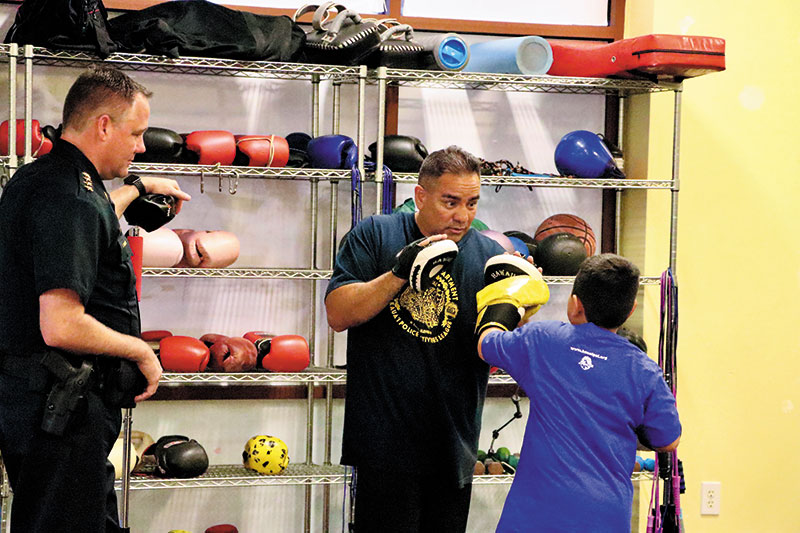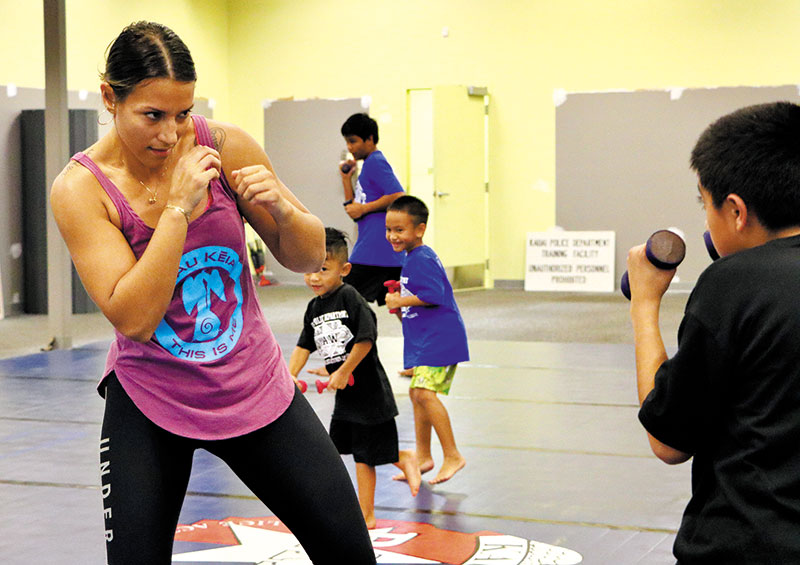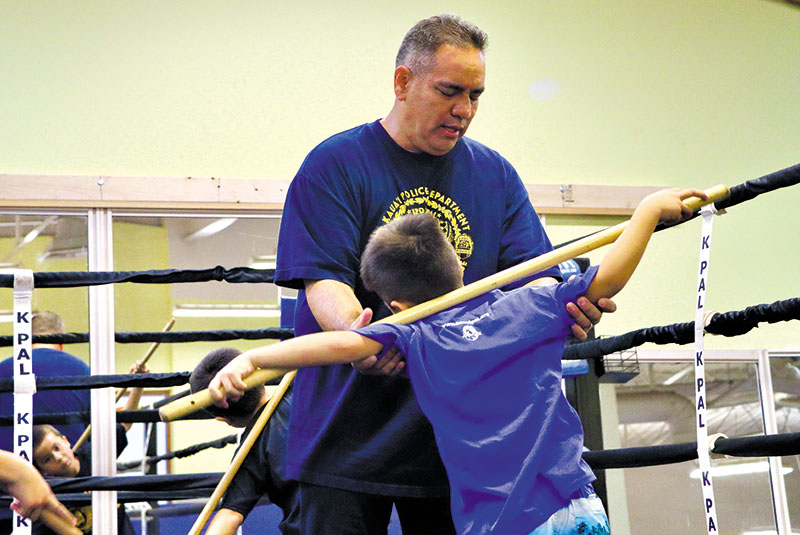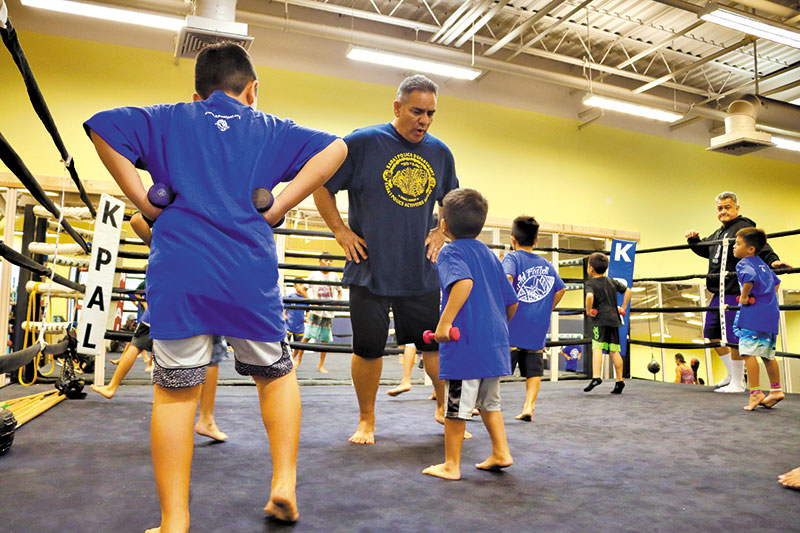K-PAL Goes The Distance
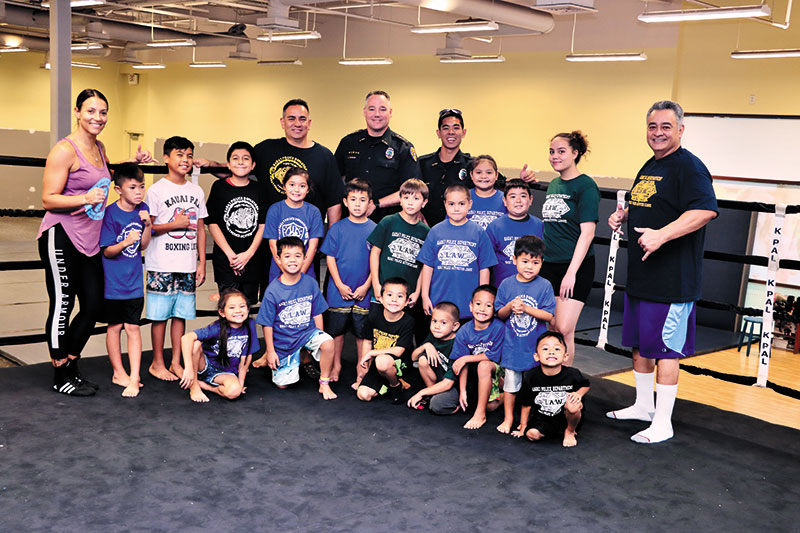
Kaua‘i Police Department Chief Todd Raybuck (back center), ~ anked by Capt. Mark Ozaki (left) and Sgt. Lance Okasaki (right), are joined by Kaua‘i Police Activities League coaches Franci DÃ vila (far left) and Marty Amaro (far right), and youth boxers at K-PAL’s new digs at Kukui Grove Center.
In a beautifully remodeled corner space at Kukui Grove Center, Kaua‘i Police Department Capt. Mark Ozaki is busy cleaning, as he prepares to coach a youth boxing class for Kaua‘i Police Activities League. With mop in hand, he laughs at the memory of mopping rain water at K-PAL’s old, leaky building near Vidinha Stadium.
After nearly two decades in its original facility, K-PAL relocated to its new, expansive Kukui Grove space this month — with a grand opening planned for early 2020. The move was first initiated by KPD’s former acting chief, Michael Contrades, and continued by current Chief Todd Ray-buck, who had some help from Mayor Derek Kawakami.
“They pushed to get us into (this new space) and ended up finishing what (Contrades) had started,” says Ozaki. “If it wasn’t for their support, we wouldn’t even be able to dream of coming here. We’d still be in that little place fi ghting buckets of rain.”
Adds Raybuck: “This is the most exciting facility that we’ve ever had. It gives us all the (space) that we need. More importantly, it gives us the opportunity to connect with (a) larger part of the community because in the long-term goal, what I’d like to see for K-PAL is for the community to really understand how important this is, to walk past these doors and see the excitement and the joy.
“We want our community, especially our keiki, to understand that the police are their friends, that we’re here to help, that we’re more than just what we see on television, that we’re more than those unfortunate situations when we’re (having to do) our job,” he adds. “K-PAL allows them to see us as people and not just (an authority) position and a badge, but more of a coach, which is really important.”
K-PAL offers a different type of mentorship for island keiki. While its programs are open to any child that wants to participate, the organization focuses on reaching at-risk kids. K-PAL often receives referrals from teachers, counselors, coaches and officers.
The organization offers a low annual fee of just $25, with a program waiver for qualifying families. Children on free or reduced school lunch, for example, automatically have the fee waived.
“A lot of times, (these are) the families that have at-risk kids, and not because they have bad parents but because sometimes parents are working three jobs just to get by, and these kids are at home, (less) supervised. Not intentionally, that’s just how it is,” Ozaki says.
The organization and its volunteers work hard to fill that gap by creating programs not currently or regularly offered on island.
“When K-PAL began, there was no boxing program on the island. Wrestling never existed on Kaua‘i,” Ozaki continues. “We were the only island that didn’t have high school wrestling.”
K-PAL started its wrestling program in 2004, filling mats in the three high school districts. Based on the success of that K-PAL program, area high schools now have their own successful wrestling programs.
K-PAL’s North Shore basketball program, under the direction of Bill Troutman, includes special needs children, who are completely integrated into the teams. There is even a K-PAL senior citizen basketball team that regularly competes against the K-PAL 5and 6-year-olds.
Meanwhile, K-PAL’s boxing program is part of USA Boxing, with some of its athletes over the years ranking nationally. The organization also offer the only all-girls boxing class on the island.
Reigning Miss Teen Hawai‘i Ki‘ilani Arruda is a member of K-PAL’s boxing program and trains under the direction of coach Franci DÃ vila, who is the current state boxing champion in her weight class.
When DÃ vila first arrived on Kaua‘i, she began training with Ozaki. In fact, she found the gym before she even landed a job.
“(K-PAL) was the first home I had on Kaua‘i,” she says.
And that’s kind of the point.
“K-PAL is the opportunity for these kids to feel empowered, feel like they have a purpose, that they have a home,” adds Raybuck. “They come through the door with a level of excitement, they know right where to go, they start putting their gear aside, they start preparing for the day, they love doing what they do.”
As a nonprofit, funding is necessary to keeping things up and running. But maybe more important are the hearts behind the mission. Volunteers, then, are essential to the program’s success.
“These guys are in here volunteering their time, their materials, they put in hundreds of hours that they are never paid, that we could never re-pay them. They come here and they make this happen because they believe in it and they believe in the kids,” says Raybuck.
Currently, K-PAL has approximately 100 volunteers working with over 1,000 keiki.
“We’ve been surviving all of these years,” says Ozaki. “We’re not rich, we don’t have deep pockets, (but) we do have support. We have good partners; positive people who share our philosophy, which is filling playgrounds, not prisons. We don’t care if kids become professional athletes, we just want them to be good people. You never know when the seeds you plant grow and turns into fruits.”
For more information, visit kauaipal.org.
Keeping K-pal Up and Running
Kaua‘i Police Activities League has been serving island youth for a number of years, and a big part of what makes its mission successful are the donations that come in from good-hearted people. All funds brought in to K-PAL go directly to the program. There are no paid employees.
“We have really generous donors and contributors. People give $1,000 and it goes a long way. We don’t need much,” says Kaua‘i Police Department Capt. Mark Ozaki, who also serves as one of the organization’s youth coaches.
Organizations like North Shore Lions Club, Po‘ipū Beach Rotary Club and myriad agricultural companies regularly give annual donations to K-PAL.
In addition, this September, Honolulu Professionals Foundation donated $20,000 to K-PAL, which marked HPF’s first large donation to a Garden Isle organization.
“We are very fortunate to partner with K-PAL for our 2019 event,” says HPF president James Odan. “With a number of our board members having strong connections to Kaua‘i, we wanted to support a nonprofit that hit close to home and was aligned with HPF’s continued commitment to raise money for local foundations, especially those with an emphasis on youth and educational programs.”


